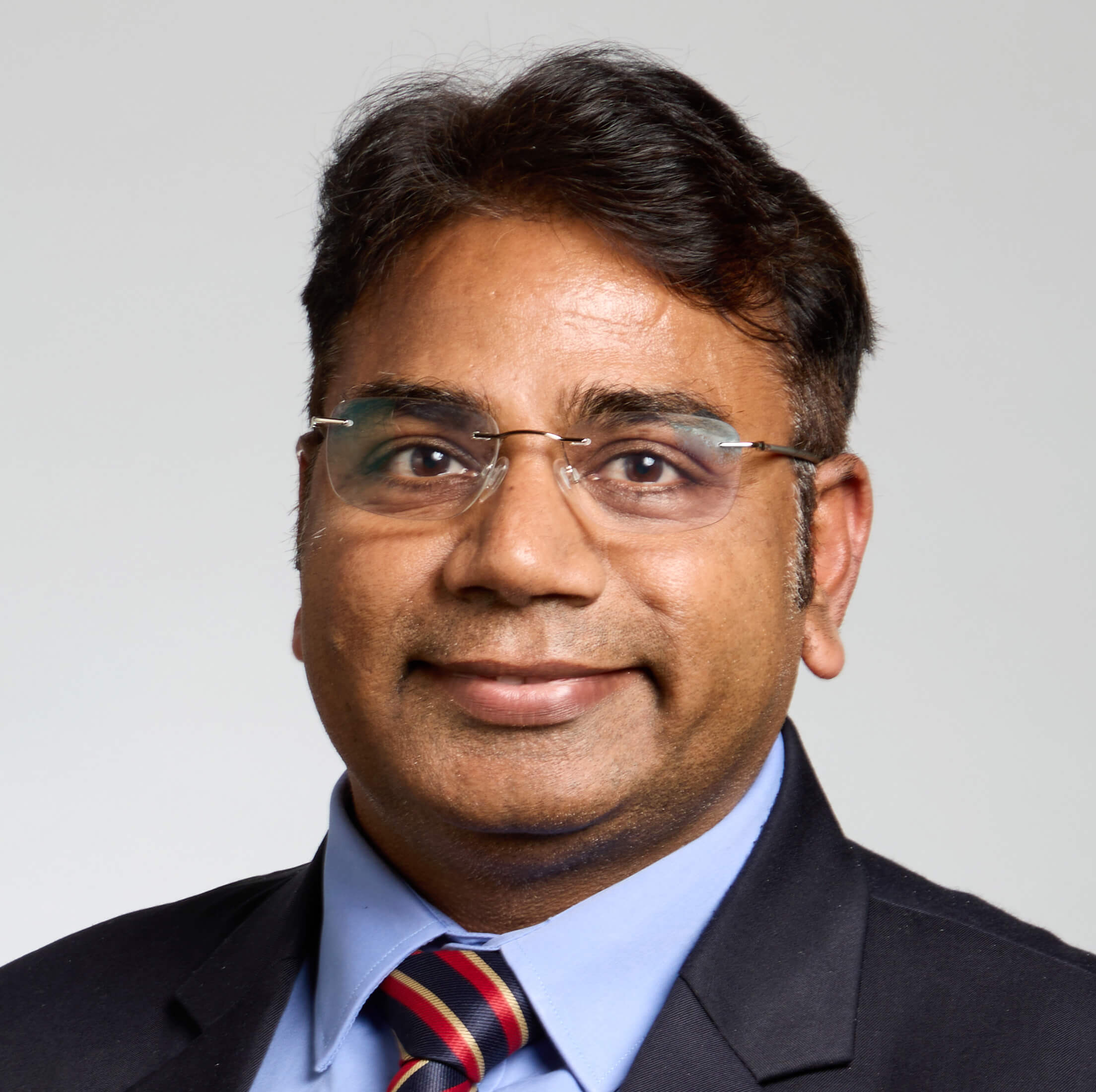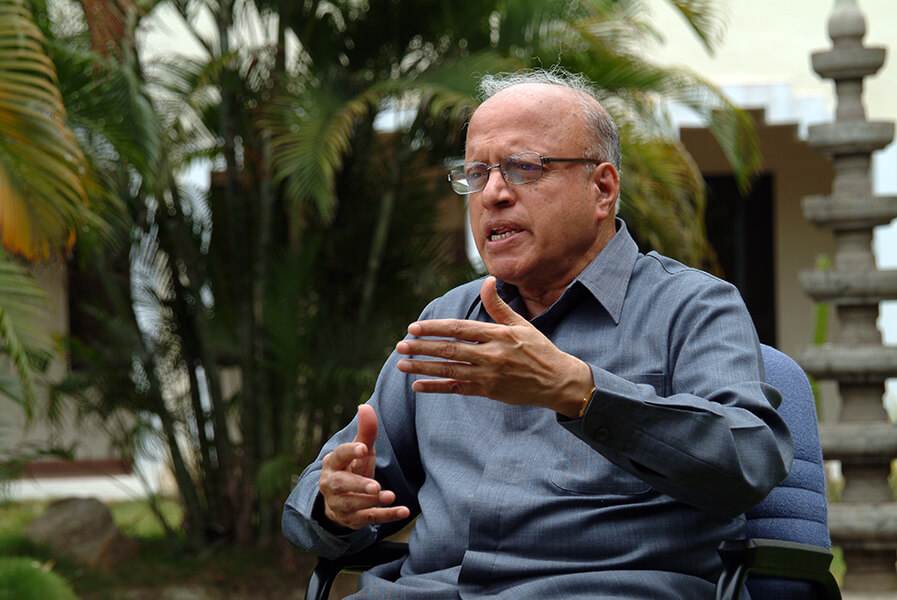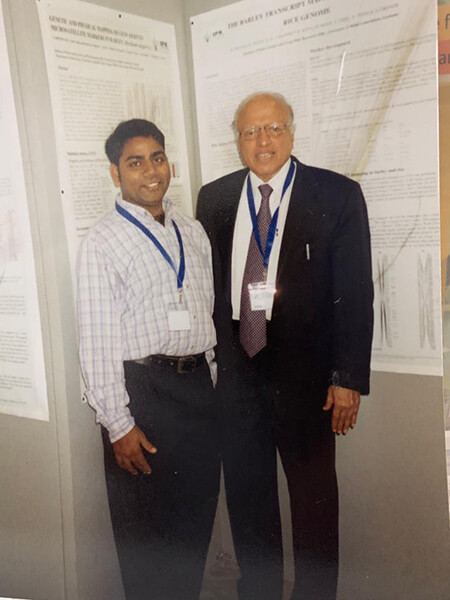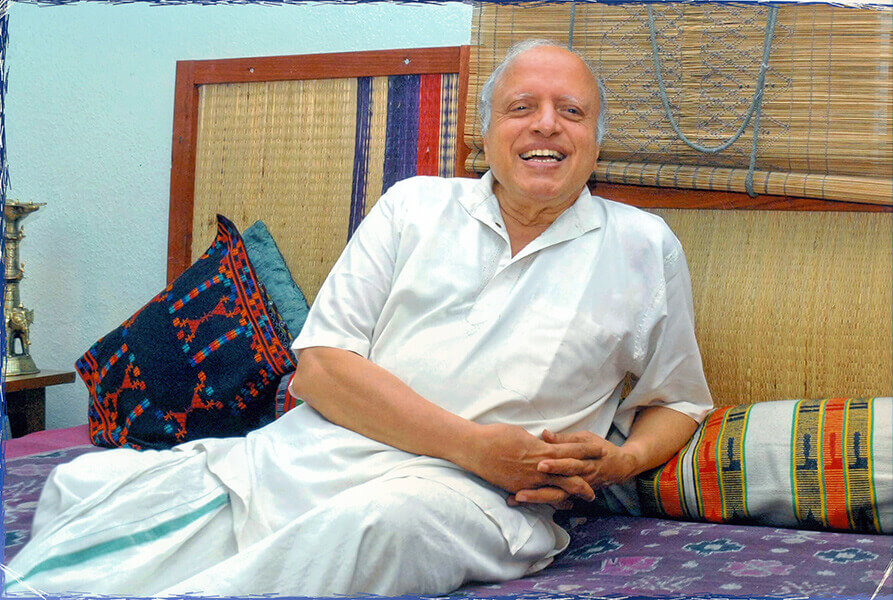Rajeev Varshney, a globally renowned Indian agri scientist, writes a personal tribute to his hero and mentor Dr MS Swaminathan
 Rajeev K Varshney
Rajeev K Varshney 
Rajeev Varshney, a globally renowned Indian agri scientist, writes a personal tribute to his hero and mentor Dr MS Swaminathan
 Rajeev K Varshney
Rajeev K Varshney
In the annals of India’s agricultural history, one name stands out brilliantly–MS Swaminathan, popularly known as MSS. His passing away, at the age of 98 years, on September 28, 2023 in Chennai has left a void that can never be filled, but his indomitable spirit and vision will continue to inspire generations of young scientists and shape the course of agriculture for years to come.
International impact
Born on August 7, 1925, in Kumbakonam, Swaminathan dedicated his life for the betterment of humanity through his pioneering work in agriculture and food security. He was instrumental in developing high-yielding crop varieties that led to a significant increase in food production between 1960 and 1970, making India self-sufficient in food and dispelling looming fears of famine. For this monumental contribution, he is hailed as the ‘Father of India’s Green Revolution’. Professor Swaminathan’s research contributions to agriculture were not confined to India alone. He actively collaborated with international organizations, including Consortium of International Agricultural Research Centers (CGIAR), UN’s Food and Agriculture Organization (FAO) and UNESCO leveraging his vast knowledge and expertise to tackle global food security challenges. Notably, he played a key role in the establishment of the International Crop Research Institute for the Semi-Arid Tropics (ICRISAT) in India (where I worked for 17 years), the International Board for Plant Genetic Resources (now known as Biodiversity International) in Italy and the International Council for Research in Agro-Forestry in Kenya. His guidance was instrumental in shaping numerous institutions in China, Vietnam, Myanmar, Thailand, Sri Lanka, Pakistan, Iran, and Cambodia.

Swaminathan had a distinguished educational background. He pursued his BSc at the University of Kerala and Tamil Nadu Agricultural University. He completed his MSc from the Indian Agricultural Research Institute (IARI) and was a UNESCO Fellow at Wageningen Agricultural University. Subsequently, he earned his PhD from the University of Cambridge and undertook post-doctoral studies at the University of Wisconsin. In a defining decision, he declined a faculty position in the USA, choosing to return to India in 1954 to drive impactful change in his homeland. Subsequently, he served the Central Rice Research Institute, IARI, and then the Indian Council of Agricultural Research as well as international organizations in various roles. He served as Director of the Indian Agricultural Research Institute (1966-72), Director General of ICAR and Secretary to the Government of India, Department of Agricultural Research and Education (1972-79), Principal Secretary, Ministry of Agriculture (1979-80), Acting Deputy Chairman and later Member (Science and Agriculture), Planning Commission (1980-82) and Director General, International Rice Research Institute, the Philippines (1982-88). One of his most pivotal roles came in 2004 when he was appointed chair of the National Commission on Farmers. This commission was established in response to rising farmer distress and alarming rates of suicides among farmers. The commission’s report, submitted in 2006, made several recommendations. A prominent suggestion was that the minimum selling price (MSP) should be at least 50% above the weighted average cost of production.
Farmers’ friend
Swaminathan was a steadfast advocate for smallholder farmers and sustainable farming practices. He passionately believed in harnessing the power of science to uplift the marginalized. As a staunch supporter of equipping farmers with the knowledge and resources they need, he envisioned a holistic approach to agriculture. This approach emphasizes the significance of preserving biodiversity, conserving natural resources, and adopting environmentally friendly farming techniques. To further this cause, he founded the MS Swaminathan Research Foundation (MSSRF) in 1988. Since its inception, he had been dedicatedly serving and, in recent times, guiding MSSRF in its mission to develop and promote strategies for economic growth. These strategies are primarily aimed at increasing the employment opportunities for impoverished women in rural areas.
A lodestar for Indian scientists
Having Swaminathan as an inspiration in my early career (my PhD in India and Post-doc in Germany) and then a mentor and guide since joining ICRISAT in 2005, has been a privilege and instrumental for my research career. His humility, warmth, and passion for agriculture were palpable. He was always eager to listen to young scientists, to encourage new ideas, and to guide them on the path of innovation. I learnt the importance of interdisciplinary research and collaboration from him as he always emphasized that the challenges of agriculture required a holistic approach. That’s what I adopted during my tenure at ICRISAT for 17 years (2005-2022) and continue to deploy at Murdoch University.

I first met Swaminathan during my early days as a PhD student when I attended a conference organized by him and the late Lalji Singh at MSSRF in 1999. At that conference, I received the Best Poster Award (along with a cash prize of Rs 2000!) from Swaminathan. It remains one of the most joyous moments of my life. I then met him again in 2000 at the 2nd International Crop Science Congress in Hamburg, Germany. While I was in Germany from 2001 to 2005, I stayed in touch with Swaminathan through letters and emails. However, after joining ICRISAT in 2005, I had the privilege of interacting with him more frequently. Our numerous meetings and interactions took place at ICRISAT, MSSRF, and other locations in India and abroad. I invited him to deliver keynote speeches at several international conferences. Similarly, I attended many meetings organized by Swaminathan at MSSRF in Chennai.
Swaminathan’s life was remarkable, marked by dedication, innovation, and a profound love for the land. I recall an interaction with him during an FAO meeting in Bangkok in 2016. Despite being on a wheelchair, he was among the invited experts. Considering his advanced age and mobility challenges, I said, “Sir, you have already contributed so much to international agriculture. Perhaps you shouldn’t strain yourself by travelling so extensively.” Before I could finish, he replied, “Rajeev, interacting with young minds like yours at scientific meetings keeps me abreast of the latest advancements in agricultural science. That’s what motivates and energizes me to travel at this age.” He added, “I can’t imagine just sitting in my office when I believe I can still make a contribution to society.”
Indeed, I believe that the qualities exemplified by Swaminathan have been passed down to his children. His three daughters are proud bearers of his legacy–Soumya Swaminathan, formerly the Chief Scientist with the World Health Organization (WHO) and now the Chairperson of MSSRF; Dr. Madhura Swaminathan, an economist and Professor at the Economic Analysis Unit of the Indian Statistical Institute in Bangalore; and Nitya Swaminathan, a specialist in gender and rural development. All of them are actively contributing to societal change and human welfare.
Having been immersed in genome sequencing since 2007, I’ve always been intrigued by the secret behind Swaminathan’s boundless energy, enthusiasm, and intelligence. So, when he visited our Genomics Centre at ICRISAT, we asked if he’d be willing to provide a blood sample. With the support and collaboration of CSIR-Centre for Cellular and Molecular Biology and BGI-Shenzhen (China), we isolated his DNA, sequenced, and analyzed his genome. I had the honour of presenting his genome sequence (stored on a pen drive) to Swaminathan on his 90th birthday at MSSRF in 2015.
“When I was working on my PhD, I began to understand the double helical structure of DNA. But I never imagined I’d one day hold the fully decoded sequence of my own genome in my hands,” he said.
Such moments and interactions have served as a beacon of inspiration for countless young minds in agricultural sciences, both in India and internationally.
A lasting legacy
Swaminathan was not just a towering figure in agricultural science, but a genuine hero. His illustrious career was marked with countless awards and accolades, including Shanti Swarup Bhatnagar Award, the Ramon Magsaysay Award, and the Albert Einstein World Science Award, Fellow of The Royal Society, Padma Shri, Padma Bhushan, Padma Vibhushan, World Food Prize. I feel privileged to be one of few Indian agricultural scientists following in his footsteps to receive Shanti Swarup Bhatnagar Award and become a Fellow of The Royal Society. It was a moment of immense pride for me when upon informing Swaminathan of my election to the FRS in May 2023, I received his warm congratulatory message the very next day. He wrote “I am very happy to note that you have been elected as a Fellow of Royal Society. Kindly accept my congratulations and very best wishes on your well deserved accomplishment. A Fellow is someone who makes an “original contribution.” I wish you good health and much happiness.” That message remains my final cherished communication with him. During my conferment as an FRS at The Royal Society in July 2023, I was shown the esteemed 363-year-old Royal Society Charter, which bore the signatures of all its Fellows. The very first signature I sought was Swaminathan’s, inscribed in 1973. Finding and holding his signature filled me with elation; it was as if I was floating on cloud nine.
In closing, while we mourn the loss of Prof Swaminathan, we must also celebrate his enduring legacy. He exemplified how science can serve as a catalyst for positive change, demonstrating that research can and should be channelled to address tangible challenges. His tireless efforts and unwavering commitment to the cause of agriculture served as an inspiration for us all. We were motivated to follow in his footsteps, to carry forward his legacy, and to contribute to the growth and prosperity of agriculture. His legacy continues to inspire researchers, policymakers, and advocates worldwide to address the pressing challenges of our time, from climate change to sustainable agriculture.
Rajeev Varshney is Director of the Centre for Crop & Food Innovation, Director, State Agricultural Biotechnology Centre and International Chair in Agriculture & Food Security with the Murdoch University, Australia. This piece first appeared in his blog.